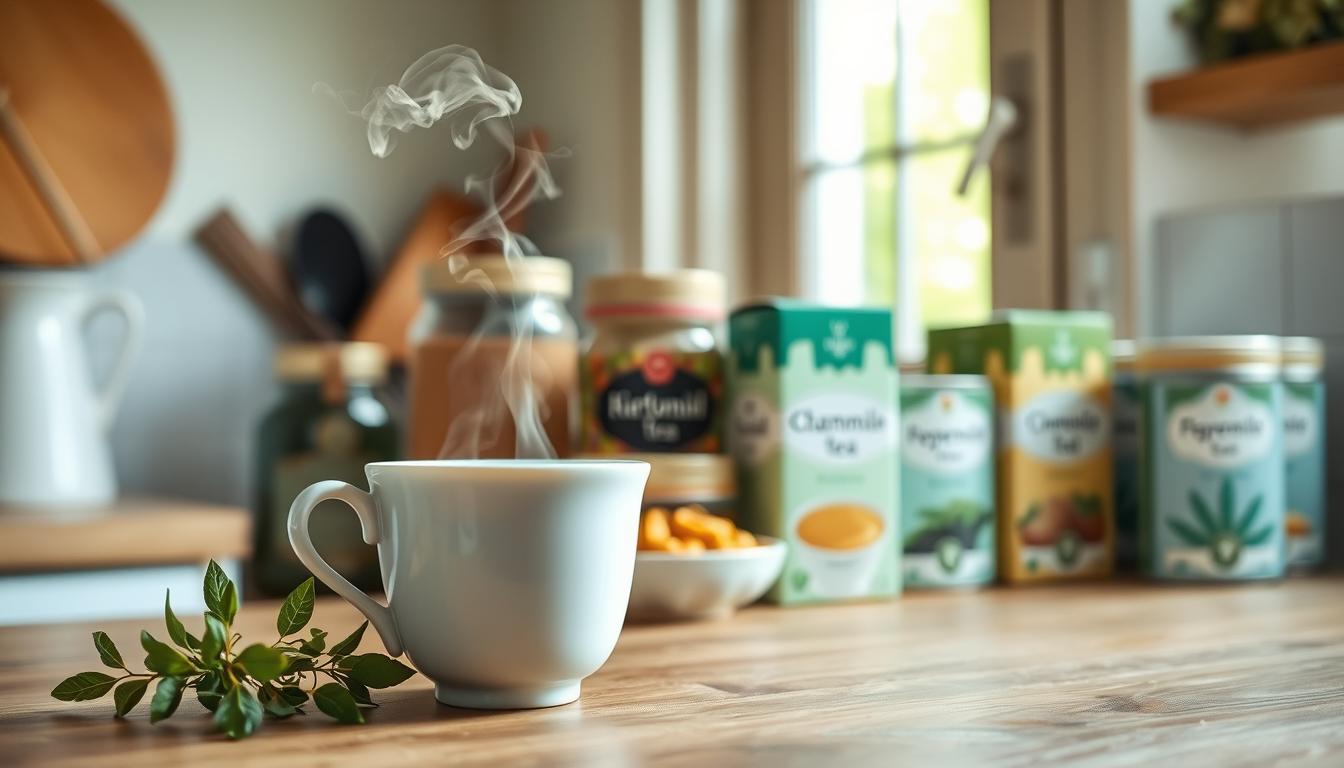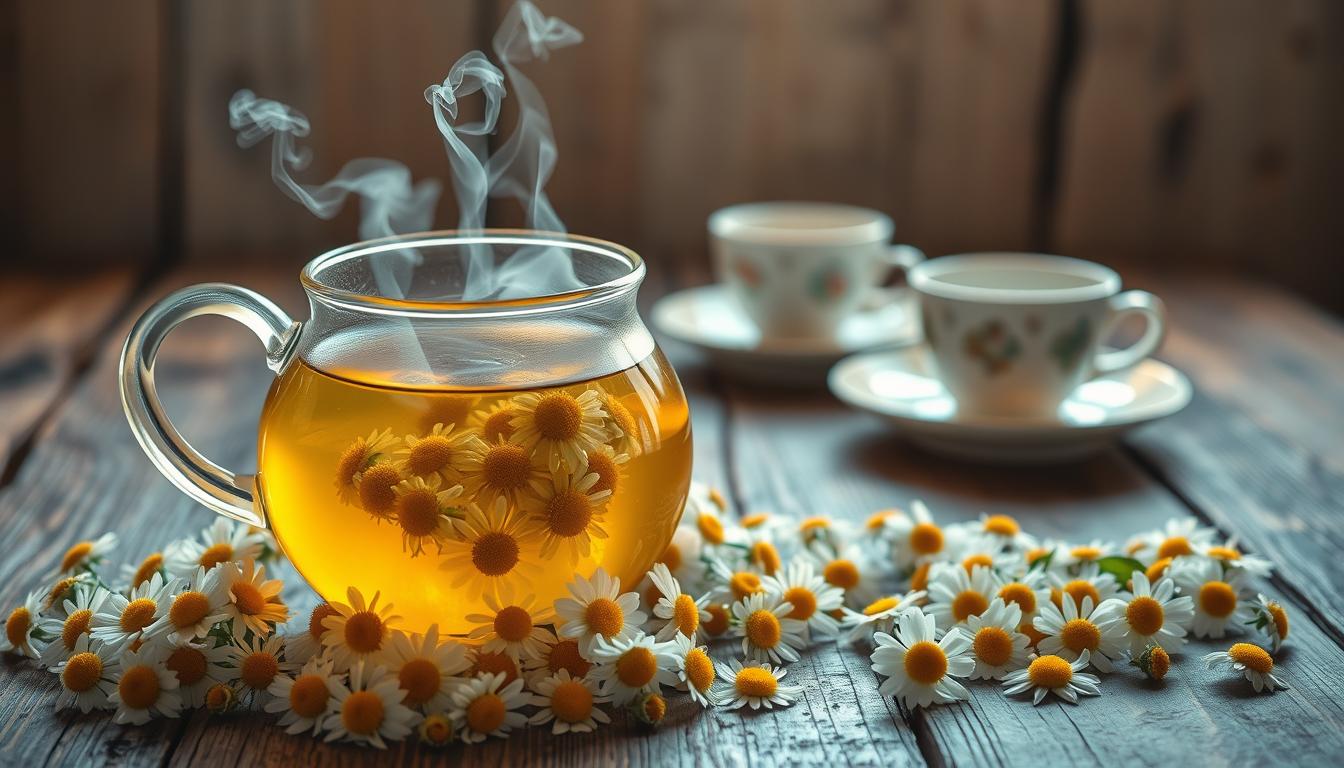Did you know that herbal teas make up nearly 20% of all tea consumed in the United States? Among these, chamomile stands out as a favorite for its calming effects and rich history in traditional medicine. But when it comes to pregnancy, the question arises: is this soothing beverage a good choice?
Chamomile tea has been used for centuries to promote relaxation and improve sleep. Its natural antioxidants and anti-inflammatory properties make it a popular option for many. However, for expectant mothers, the safety of this herbal drink remains a topic of debate.
Some studies suggest potential risks, such as uterine stimulation, which could lead to complications. On the other hand, others highlight its benefits for reducing stress and aiding digestion. With mixed opinions from experts, it’s essential to approach this topic with caution.
Always consult your healthcare provider before adding chamomile tea to your routine. This article will explore both the potential benefits and risks, helping you make an informed decision.
Key Takeaways
- Chamomile tea is a popular herbal drink with calming properties.
- Its safety during pregnancy remains a debated topic.
- Some studies suggest potential risks like uterine stimulation.
- Consulting a healthcare professional is crucial before consumption.
- This article will explore both benefits and risks in detail.
Overview of Herbal Teas in Pregnancy
Herbal teas have gained popularity for their natural benefits and soothing properties. Unlike traditional teas made from the Camellia sinensis plant, herbal varieties are crafted from various parts of plants, including roots, berries, flowers, seeds, and leaves. These caffeine-free beverages are often chosen for their unique flavors and potential health effects.

Definition and Types of Herbal Teas
Herbal teas are infusions made by steeping plant materials in hot water. They differ from black or green teas, which come from the same plant. Popular types include:
- Root Teas: Made from ginger or licorice root.
- Berry Teas: Crafted from raspberries or blueberries.
- Flower Teas: Derived from hibiscus or lavender.
- Seed Teas: Created using fennel or caraway seeds.
- Leaf Teas: Made from peppermint or lemon balm leaves.
Safety Considerations When Using Herbal Teas
The amount consumed plays a significant role in safety. Drinking one or two cups per day is generally considered safe, but exceeding this amount may pose risks. Scientific studies highlight that certain herbs can have varied effects on women, especially during pregnancy.
Key safety considerations include:
- Consulting a healthcare provider before use.
- Monitoring dosage and frequency.
- Avoiding herbs with potential uterine-stimulating effects.
Research suggests that some herbal teas offer calming or digestive benefits. However, not all are FDA-approved for pregnancy, so caution is essential.
| Type of Tea | Common Uses | Safety Notes |
|---|---|---|
| Ginger | Nausea relief | Safe in moderation |
| Peppermint | Digestive aid | Avoid in large amounts |
| Raspberry Leaf | Uterine support | Use only in late pregnancy |
Understanding these factors can help expecting women make informed choices about herbal tea consumption.
is chamomile tea safe during pregnancy
From ancient Egypt to modern times, chamomile has played a role in traditional medicine. This herb has been celebrated for its calming effects and ability to promote relaxation. Its use spans cultures, often as a remedy for stress and digestive issues.

Historical Use and Medicinal Perspectives
Chamomile’s roots trace back to ancient civilizations. Egyptians revered it for its healing properties, while Romans used it to flavor drinks and medicines. Traditional practices often highlighted its ability to improve sleep and reduce anxiety.
In many cultures, it was a go-to remedy for soothing ailments. Its gentle nature made it a popular choice for families, including expectant mothers. However, historical use doesn’t always align with modern scientific understanding.
Scientific Research and Expert Opinions
Modern studies on chamomile’s effects during pregnancy are limited. Some research suggests it may pose a risk by stimulating the uterus, potentially leading to complications. Experts caution against excessive consumption, especially in the first trimester.
On the other hand, its antioxidant properties are praised for supporting overall health. The key is balance—acknowledging its benefits while being mindful of potential concerns. Always consult a healthcare provider before incorporating it into your routine.
Chamomile’s journey from ancient remedy to modern herbal tea highlights its enduring appeal. Yet, when it comes to pregnancy, caution and professional guidance are essential.
Potential Benefits of Chamomile Tea for Expecting Mothers
Many expecting mothers seek natural remedies to support their health during this special time. Among these, chamomile stands out for its calming effects and potential benefits. While the research is not conclusive, some studies suggest it may offer advantages worth considering.
Calming Effects and Antioxidant Properties
Chamomile is known for its ability to promote relaxation. Its natural compounds may help reduce stress, which can be particularly beneficial for women during tea pregnancy. Additionally, its antioxidant properties support overall health by combating free radicals.
Some research indicates that these antioxidants may also reduce inflammation. This could be helpful for managing common discomforts. However, moderation is key—experts recommend limiting intake to one or two cups per day.
Support for Sleep and Relaxation
Quality sleep is essential for expecting mothers. Chamomile’s soothing properties may improve sleep patterns, making it easier to rest. Its gentle aroma and mild flavor contribute to a calming bedtime routine.
While these benefits are promising, it’s important to balance them with potential risks. Always consult a healthcare provider before making it part of your daily routine. This ensures that your choices align with your individual health needs.
| Benefit | Description | Recommendation |
|---|---|---|
| Calming Effects | Reduces stress and promotes relaxation | 1-2 cups per day |
| Antioxidants | Supports overall health | Moderate consumption |
| Sleep Support | Improves sleep quality | Use as part of a bedtime routine |
Incorporating chamomile into your routine can be a gentle way to enhance your well-being. By staying informed and consulting your doctor, you can make choices that support both you and your baby.
Risks and Considerations of Drinking Chamomile Tea
While chamomile offers many benefits, it’s important to weigh the risks for expecting mothers. For pregnant women, this safe drink may not always be the best choice. Understanding the potential dangers can help you make informed decisions.
Potential Uterine Stimulation and Preterm Labor
One major concern is the possibility of uterine stimulation. Some studies suggest that drinking chamomile tea might trigger contractions. This could increase the risk of preterm labor, especially in the early stages of pregnancy.
Research highlights that certain compounds in chamomile may act on the uterus. While the evidence isn’t conclusive, experts advise caution. Limiting intake or avoiding it altogether might be the safest approach for pregnant women.
Interactions, Allergies, and Dosage Concerns
Another issue is the potential for interactions with medications. Chamomile can affect how some drugs work, which could pose risks for pregnant women. Always consult your healthcare provider before adding it to your routine.
Allergic reactions are also a possibility. Some people are sensitive to chamomile, experiencing symptoms like rashes or breathing difficulties. If you’ve never tried it before, start with a small amount to test your tolerance.
Dosage is another critical factor. Even though it’s a safe drink for many, excessive consumption can lead to complications. Stick to one or two cups per day to minimize risks and prioritize safety.
In summary, while chamomile has its benefits, the potential risks for pregnant women cannot be ignored. Always consult your doctor before drinking chamomile tea to ensure it’s the right choice for you.
Guidelines for Safe Tea Consumption During Pregnancy
For expecting mothers, understanding what to drink is just as important as what to eat. Herbal beverages, including those made from various plant materials, can be a soothing choice. However, moderation and awareness are key to ensuring they remain a tea safe drink.
Recommended Amounts and Medical Consultation
Experts suggest limiting herbal drinks to one or two cups per day. This helps minimize potential risks while still allowing you to enjoy their benefits. Always consult your healthcare provider if you experience any unusual symptom after consumption.
Reading labels is essential. Look for clear information about ingredients to ensure you’re choosing a tea safe drink. Avoid products with vague or incomplete labeling, as they may contain herbs unsuitable for pregnancy.
If you’re concerned about certain herbal options, consider switching to alternatives like decaffeinated green tea. It’s a milder choice that still offers comfort without the risks associated with some plant-based blends.
- Limit intake to one or two cups daily.
- Check labels for detailed ingredient lists.
- Consult your doctor if you notice any symptoms.
- Opt for decaffeinated green tea as a safer alternative.
By following these guidelines, you can make informed choices that support your well-being and your baby’s health. Always prioritize moderation and professional advice when incorporating herbal drinks into your routine.
Other Herbal Tea Options for Pregnant Women
Exploring herbal options can be a comforting way to support your health during pregnancy. While drinking chamomile is a popular choice, other herbal teas like ginger, peppermint, and raspberry leaf offer unique benefits. Understanding their differences can help you make informed decisions.
Ginger Tea: A Natural Remedy for Nausea
Ginger tea is widely recognized for its ability to ease nausea, a common symptom during pregnancy. Its natural compounds can soothe the stomach and provide relief. Most experts consider it safe when consumed in moderation.
However, excessive intake may lead to heartburn or other digestive issues. Stick to one or two cups daily to enjoy its benefits without risks.
Peppermint Tea: Digestive Comfort with Caution
Peppermint tea is another excellent option for digestive support. Its refreshing flavor and soothing properties can help alleviate bloating and discomfort. While generally safe, large amounts may cause heartburn or interact with certain medications.
As with any herbal supplement, consult your healthcare provider before adding it to your routine.
Raspberry Leaf Tea: Preparing for Birth
Raspberry leaf tea is often used in the later stages of pregnancy to prepare for birth. It’s believed to strengthen the uterus and support labor. However, its use is controversial, and some experts advise caution due to potential risks.
If considering this option, discuss it with your doctor to ensure it aligns with your health needs.
Importance of Moderation and Professional Guidance
When switching between herbal teas, moderation is key. Each option has its own benefits and potential risks. Always prioritize professional advice to ensure your choices support both you and your baby.
Here are some practical tips:
- Limit intake to one or two cups per day.
- Check ingredient profiles to avoid unsuitable herbs.
- Consult your doctor if you notice any adverse reactions.
By exploring these alternatives, you can find a soothing and safe way to enhance your well-being during this special time.
Conclusion
Navigating herbal options while expecting requires careful consideration. While some herbal medicine may offer benefits like easing nausea or aiding sleep, potential risks like preterm labor or uterine stimulation cannot be ignored. Moderation is key, especially when considering factors like fetal weight and development.
Each trimester may demand different precautions. For instance, raspberry leaf is often used later in pregnancy, but its effects vary. Always consult your healthcare provider before incorporating any drink pregnancy into your routine. This ensures your choices align with your health needs and the latest evidence.
Ultimately, an informed and balanced approach is essential. By prioritizing professional guidance and carefully evaluating ingredients, you can make decisions that support both you and your baby. Stay mindful, stay informed, and trust the process.

